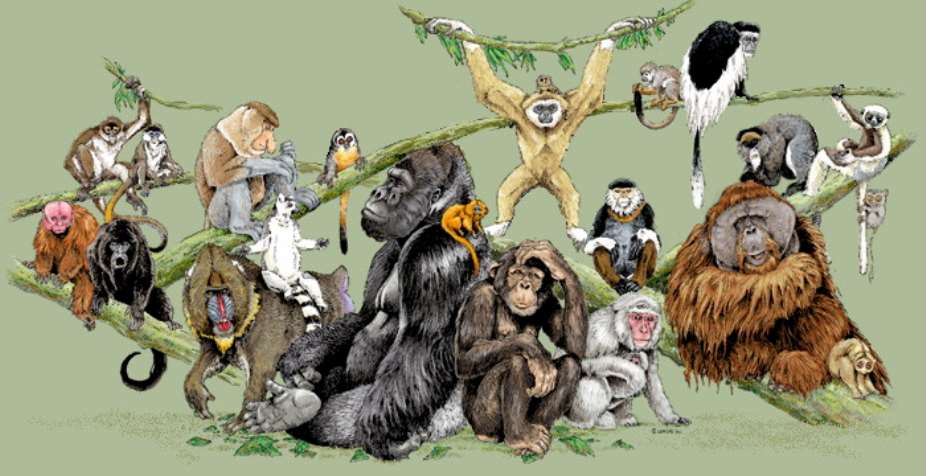According to Red List of Threatened Species of International Union for Conservation of Nature (IUCN Red List), “Primate” is a grouping of a wide range of mammals, there are 89 mammal species in Bangladesh, of which 3 are critically endangered, 12 are endangered, 16 are vulnerable, and 4 are near-threatened. In this line, there the Royal Bengal Tiger, Asian Elephant, Dugong, Crab-eating Macaque, Gray Langur, Polynesian Rat, Asiatic Long-tailed Climbing Mouse, Asian House Shrew, Sunda Pangolin, Blue Whale, Pantropical Spotted Dolphin, Risso's Dolphin, Clouded Leopard, Red Fox, European Otter, Indian Rhinoceros, Blackbuck and Gaur are most said primates names due to Threatened Species in Bangladesh.
Due to geographical location of Bangladesh on the Bay of Bengal, the country is very suitable for wildlife and water life, especially for primates’ mammals. According to World Bank and others national & international organizations report, there 11.06 % (16321.242 sqm) of total land covers forest area in Bangladesh. The largest areas of forest are in the Chittagong Hills and the Sundarbans. Chittagong Hills’ forest covers more than 4,600 square kilometers; and Sundarbans, a tidal mangrove forest covering nearly 6,000 square kilometers. Also, Bangladesh is a riverine country. About 700 rivers including tributaries flow through the country constituting a waterway of total length around 24,140 kilometers and maritime boundary of Bangladesh own sovereign on 118,813 sq km of waters extending up to territorial waters of Bangladesh extend 12 nautical miles (22 km) and the exclusive economic zone of the country is 200 nautical miles (370 km) in the Bay of Bengal Sea.
Besides, the forest & water areas in Bangladesh, there lots of primates live in the human localities in different districts in Bangladesh. But due to the development oriented intervention in the river, sea and forest areas, which most of those are unplanned and not well planned; the primates’ lives are under threatened.
Forestry & Environment Departments and Water, River & Sea Departments along with relevant Ministries of Bangladesh Government has been taken many initiates directly, indirectly and many government, non-government organizations, universities, civil society & expertise also involved to reduce the intervention in the primates life and reserved their rights & conservation. But recently, government initiative for 74,21,935 square meters areas project plan of Rampal Coal-fired Power Station just 14 km distanced from the Sunderbans the world largest mangrove forest approximated the more threaten for primates mammals as well as making vulnerable to all wild life in the forest.
All over, the initiatives has been taken for conservation of mammals life & their rights including free rang forestry are not enough in Bangladesh due to lack of international standardization & proper guidelines. So in this circumstance, American Society of Primatologists (ASP) as world’s leading organization in this field, will take necessary steps in cooperation with University of California at Davis in United States to preserve the rights of Primate grouping mammals and their conservation including biodiversity conservation and create available free rang forest, river & sea and facilitate perfectly free livelihood of primates in Bangladesh.





 There’s nothing you can do for us; just give us electricity to save our collapsi...
There’s nothing you can do for us; just give us electricity to save our collapsi...
 Ghanaian media failing in watchdog duties — Sulemana Braimah
Ghanaian media failing in watchdog duties — Sulemana Braimah
 On any scale, Mahama can't match Bawumia — NPP Youth Organiser
On any scale, Mahama can't match Bawumia — NPP Youth Organiser
 Never tag me as an NPP pastor; I'm 'pained' the 'Akyem Mafia' are still in charg...
Never tag me as an NPP pastor; I'm 'pained' the 'Akyem Mafia' are still in charg...
 Your refusal to dedicate a project to Atta Mills means you never loved him — Kok...
Your refusal to dedicate a project to Atta Mills means you never loved him — Kok...
 2024 elections: I'm competent, not just a dreamer; vote for me — Alan
2024 elections: I'm competent, not just a dreamer; vote for me — Alan
 2024 elections: Forget NPP, NDC; I've the Holy Spirit backing me and nothing wil...
2024 elections: Forget NPP, NDC; I've the Holy Spirit backing me and nothing wil...
 2024 elections: We've no trust in judiciary; we'll ensure ballots are well secur...
2024 elections: We've no trust in judiciary; we'll ensure ballots are well secur...
 Performance tracker: Fire MCEs, DCEs who document Mahama's projects; they're not...
Performance tracker: Fire MCEs, DCEs who document Mahama's projects; they're not...
 Train crash: Railway ministry shares footage of incident
Train crash: Railway ministry shares footage of incident
